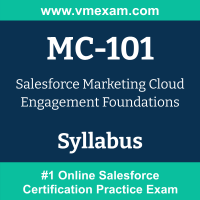 The Salesforce MC-101 exam preparation guide is designed to provide candidates with necessary information about the Marketing Cloud Engagement Foundations exam. It includes exam summary, sample questions, practice test, objectives and ways to interpret the exam objectives to enable candidates to assess the types of questions-answers that may be asked during the Salesforce Certified Marketing Cloud Engagement Foundations exam.
The Salesforce MC-101 exam preparation guide is designed to provide candidates with necessary information about the Marketing Cloud Engagement Foundations exam. It includes exam summary, sample questions, practice test, objectives and ways to interpret the exam objectives to enable candidates to assess the types of questions-answers that may be asked during the Salesforce Certified Marketing Cloud Engagement Foundations exam.
It is recommended for all the candidates to refer the MC-101 objectives and sample questions provided in this preparation guide. The Salesforce Marketing Cloud Engagement Foundations certification is mainly targeted to the candidates who want to build their career in Salesforce Associate domain and demonstrate their expertise. We suggest you to use practice exam listed in this cert guide to get used to with exam environment and identify the knowledge areas where you need more work prior to taking the actual Salesforce Marketing Cloud Engagement Foundations exam.
Salesforce MC-101 Exam Summary:
|
Exam Name
|
Salesforce Marketing Cloud Engagement Foundations |
| Exam Code | MC-101 |
| Exam Price |
Registration fee: USD 75 Retake fee: Free |
| Duration | 70 minutes |
| Number of Questions | 45 |
| Passing Score | 65% |
| Recommended Training / Books | Prepare for Your Salesforce Marketing Cloud Engagement Foundations Credential |
| Schedule Exam |
Kryterion Webassessor PEARSON VUE |
| Sample Questions | Salesforce MC-101 Sample Questions |
| Recommended Practice | Salesforce Certified Marketing Cloud Engagement Foundations Practice Test |
Salesforce Marketing Cloud Engagement Foundations Syllabus:
| Section | Objectives | Weight |
|---|---|---|
| Marketing Concepts |
- Describe key components of a marketing strategy and how they align with the overall marketing purpose.
- Given a scenario, identify key requirements for implementing an effective email opt-in process in a marketing campaign. - Recall the regional nature of privacy laws with respect to the subscriber base in order to uphold privacy standards in the context of marketing. - Given a scenario, provide examples of basic email goals, metrics, and relative value in assessing the success of a marketing campaign. - Given a customer experience scenario, summarize the type of content and message conveyed to the target audience. |
28% |
| Marketing Cloud Engagement Basics |
- Identify solutions for regional or business related account structures as they relate to business units and corresponding permissions in Marketing Cloud Engagement.
- Apply essential features of Marketing Cloud Engagement (MCE) for marketing activities. - Identify different Salesforce curated resources for assistance, training, and support when using Marketing Cloud Engagement. - Differentiate between subscriber keys, contact keys, and contact IDs to uniquely identify subscribers. - Given requirements, determine a proper Cloudpage form submission setup. |
22% |
| Email Sending and Journeys |
- Outline the necessary configurations to activate a journey and configure entry criteria for a successful activation.
- Given a scenario, identify the recommended configuration for the email send wizard settings. - Distinguish between template components and content blocks when building emails in Marketing Cloud Engagement. - Given a scenario, identify which journey functionality should be used to address business needs. - Given a scenario, identify how to accomplish content rendering validation. |
22% |
| Data Management |
- Given a scenario, summarize the various data import mechanisms and requirements.
- Configure settings when creating a new data extension, including settings for data fields. - Given a scenario, recommend the best way to interpret a data extension to identify the desired target data |
18% |
| Reporting and Analytics |
- Identify where specific data can be found in Marketing Cloud Engagement.
- Interpret undesired send results and possible deliverability consequences. |
10% |
